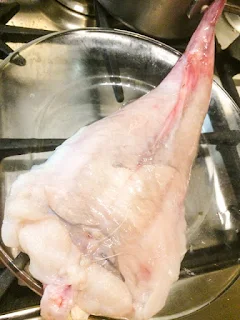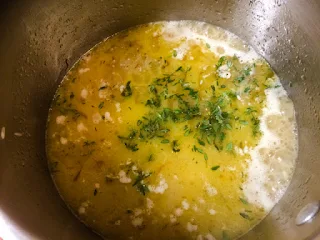Christmas is coming and what better way to celebrate than by ensuring you get the very best out of our Great British Seafood by hinting that you want this excellent new fish cook book from Galton Blackiston...
and when the first thing you see is a quote from the Father of Fish you know it's going to be a worthy fish cook book!
The proof of the pudding is in the eating so what better way to review the book than by giving a recipes a go using one of our most abundantly landed fish...
from the market in Newlyn - a whole monkfish tail.
To go with with the spiced Cornish monkfish is a big aromatic saffron-yellow rice ...
from the market in Newlyn - a whole monkfish tail.
To go with with the spiced Cornish monkfish is a big aromatic saffron-yellow rice ...
the rice that gets a few extra ingredients...
to give it that extra sweetness and distinctive colour...
while the whole monk tail first needs coating in a Rasel el hanout spice (which is a great Moroccan spice that can be bought readymade) and browning quickly in a pan...
before roasting in a hot oven...
and serving coated with a simple but hugely tasty curry sauce - just blend mushroom, shallots, butter and cream. This is just one dish from the Spicy section of the book that adds that extra zing to every dish. if you like your shellfish dishes then this book will keep you in good company for dishes that celebrate crab, prawns, scallops, lobster and langoustine!
The book has a neat transparent book jacket that doubles as handy book marks. Inside, over 90 clearly explained recipes are divided up by the kind of meal you might want to serve, Quick, Small Plates, Stress-Free, Mains and so on - with an excellent Basics section, at the back, every dish is referenced by the main ingredient in the index. John Scott Blackwell's photos capture each and every dish as they would appear on the table.
Hook Line Sinker – is a seafood cookbook by Galton Blackiston published by FacePublications.com
Galton Blackiston runs the Michelin-starred Morston Hall hotel and restaurant on the Norfolk coast, and recently opened No1 Cromer, a modern take on the traditional fish and chip restaurant.
Galton is a familiar face to UK food lovers from his regular appearances on the BBC’s Saturday Kitchen, and as a finalist on Great British Menu.
Galton Blackiston says: “Seafood is one of the last truly wild sources of food on the planet. Even though fishing methods have changed dramatically, fish are still wild, living in their natural habitat, and are free to swim where they want and feed how they want. I’m as enthusiastic about it today as I was as a child when I used to go shrimping and catching mackerel.”
The book is a collaboration with Leeds-based specialist publisher Face Publications, whose previous cookery books with Michelin-starred chefs Sat Bains, Graham Garrett, Andrew Pern and James Mackenzie have won international awards.
The book features a foreword by Michel Roux OBE, who says: “Like all the best recipe books, Hook Line Sinker is not merely a collection of recipes but an honest celebration of life, discoveries and ideas: a story shared about the simple, sometimes nostalgic, pleasures of sharing and eating. Few are so intimately and enjoyably written as this one by my friend Galton Blackiston.”


































